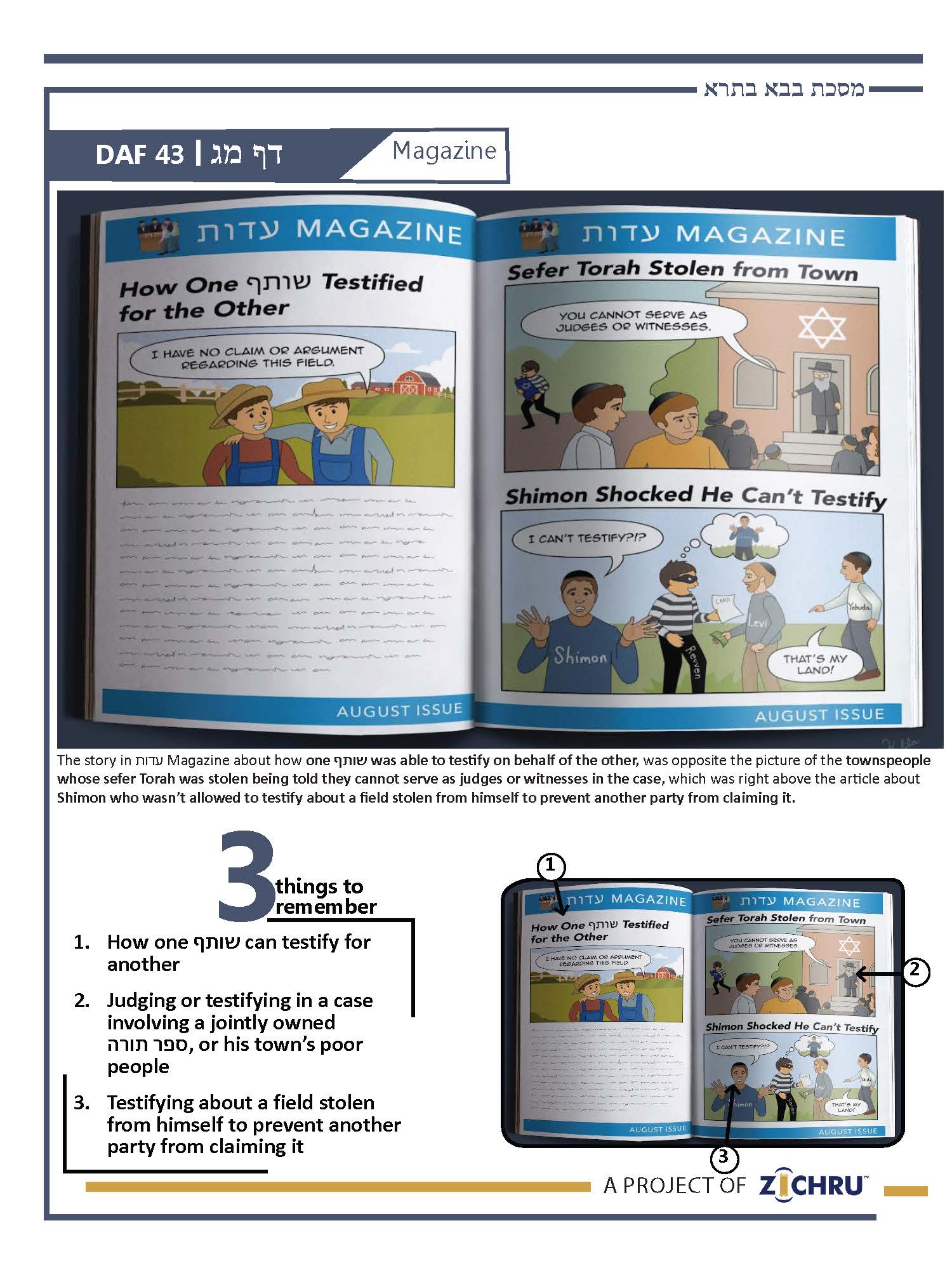Bava Basra - Daf 43
- Audio Timestamps
0:00 - The 3 Sugyos
2:48 - Review of 3 Sugyos
5:28- Siman
8:21 - 4 Blatt Back Chazarah
16:01 - Pop Quiz (Last 7 blatt)
For access to all Zichru resources including PDFs, and illustrations CLICK HERE
- How one שותף can testify for another
On the previous Daf, Shmuel said that שותפין can testify for one another (i.e., if one person’s ownership is challenged, the other can testify on his behalf). The Gemara asks: אמאי נוגעין בעדותן הן – Why? But they have an interest in their testimony. Since they own the land jointly, any loss in the court case harms both partners!? It answers that the שותף testifying gave up his right in the property, by writing to his partner: דין ודברים אין לי על שדה זו – “I have no claim or argument regarding this field.” Although such a declaration is usually ineffective for property one already owns, the case is כשקנו מידו – where [his שותף] additionally acquired it from him with חליפין. The Gemara asks that he still gains from his testimony: הרי מעמידה בפני בעל חובו – he places it before his creditor for collection of an earlier debt, which he could not do if it was taken away (and leaving his debt unpaid renders him a לוה רשע ולא ישלם – an evil borrower who does not pay)!? The Gemara explains that he accepted אחריות דאתיא ליה מחמתיה – responsibility to reimburse his partner for [claims] caused by his debts. Thus, he will owe someone money, regardless of whether he testifies.
- Judging or testifying in a case involving a jointly owned ספר תורה, or his town’s poor people
The Gemara quotes a Baraisa proving that relinquishing one’s share in jointly owned property does not remove his interest in the case: בני עיר שנגנב ספר תורה שלהן – if townspeople had their sefer Torah stolen, they cannot serve as judges or witnesses in the case, because of their personal interest. The Gemara asks, ליסלקו בי תרי מינייהו ולידיינו – let two of them withdraw from their rights in the sefer Torah and let them try the case with their testimony!? It answers: שאני ס"ת דלשמיעה קאי – a sefer Torah is different, for it is used to be heard, so he will still benefit from it even without ownership.
The Gemara asks from another Baraisa discussing a donation given to the town’s poor people, which teaches that the townspeople cannot act as judges or witnesses on the case. After answering that the Baraisa refers to a sefer Torah (because anyone lacking one is considered “poor”), it then explains that the Baraisa is discussing poor people who were the town’s responsibility, so the residents have a personal benefit from their financial gain.
- Testifying about a field stolen from himself to prevent another party from claiming it
A Baraisa teaches that if one sold a house or field to someone, אין מעיד לו עליה – he cannot testify for [the buyer] regarding it, מפני שאחריותו עליו – because its responsibility is upon him, so he is נוגע בעדות. On this Daf, Rav Sheishess explains the case: Reuven stole a field belonging to Shimon and sold it to Levi. A fourth person, Yehudah, came forward and claimed the field was his. The Baraisa teaches that Shimon cannot testify (with another עד) on Levi’s behalf, דניחא ליה דהדרא – because [Shimon] prefers that Levi retains it, so it will later return to Shimon, when he proves the field was stolen from him. He is not testifying that it belongs to Levi, because this admission would prevent him from reclaiming the field later. Rather, he is testifying only that it is not Yehudah’s (e.g., that Yehudah’s עדים are invalid). Although whatever proof Shimon will later muster to reclaim the field could also be used to extract it from Yehudah, he finds Yehudah a more difficult person to litigate against (the Gemara gives an additional explanation). On the next Daf, the Gemara rejects this interpretation of the Baraisa, and offers another.
Siman – Magazine
The story in עדות Magazine about how one שותףwas able to testify on behalf of the other, was opposite the picture of the townspeople, whose Sefer Torah was stolen, being told they cannot serve as judges or witnesses in the case, which was right above the article about Shimon who wasn’t allowed to testify about a field stolen from himself to prevent another party from claiming it.


